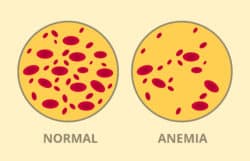Non-Invasive Prenatal Screening for Twin Pregnancies
A number of factors make twin pregnancies higher-risk, higher-cost, and harder-to-manage than singleton pregnancies. These factors include generally higher gestational age and fewer suitable options for screening and diagnostic tools, which are becoming increasingly important for obstetricians to find solutions to due to the rising rate of twinning in the United States. Fortunately, as Dr.
CVS and Amniocentesis: What, How, and Why
Testing is at the heart of prenatal genetics. With an accurate approach, prenatal genetic testing can help determine the right care plan for you and your baby. Two of these testing options, CVS and amniocentesis, are two uncommon testing options offered by our award-winning team. On our latest episode of “Healthful Women,” Dr. Nathan Fox meets with MFMA founder and president, Dr.
UNDERSTANDING ANEMIA IN PREGNANCY, Andrei Rebarber, MD (Video)
When a woman’s body requires more iron than is available, iron deficiency anemia can occur during pregnancy. While mild anemia is common during pregnancy due to an increase in blood volume, more severe anemia may put the baby at a higher risk for anemia later in infancy. During pregnancy, a woman’s body produces more blood
PRIMARY CONDITIONS RELATED TO FETAL ANEMIA, Andrei Rebarber, MD (Video)
In the past, there was no way to identify babies that were anemic, even though doctors knew that they might be at risk. There are several risk factors for fetal anemia, one of which includes when the mother develops antibodies to certain proteins on the surface of red blood cells which then cross the placenta
THE FOUNDING OF MATERNAL FETAL MEDICINE ASSOCIATES, Andrei Rebarber, MD (Video)
Dr. Rebarber is one of the four founders of Maternal Fetal Medicine Associates. He explains that they felt they could build a better medical practice that provided the best patient-focused care with world-class physicians, all using the highest level of technological equipment in a caring, supportive environment. The motivation for this was that “while working
WHAT IS A MATERNAL FETAL MEDICINE SPECIALIST?, Andrei Rebarer, MD (Video)
A maternal fetal medicine specialist is a physician that has gone through an obstetrics and gynecology residency program for four years and then an additional three years of subspecialty training. This training focuses on the management of maternal medical complications during pregnancy, as well as the ability to identify fetal issues that may occur that
WHY AM I A MATERNAL FETAL MEDICINE SPECIALIST?, Andrei Rebarber, MD (Video)
Have you ever wondered what exactly leads someone to become an MFM specialist? Read on to learn about Dr. Rebarber’s journey! During his medical school experiences at SUNY Health Science Center, he rotated through cardiology, though found that his passions lied elsewhere. He joined a six-week rotation where he got to work with some maternal
GET TO KNOW DR. ANDREI REBARBER: AN INTERVIEW, Andrei Rebarber, MD (Video)
Dr. Andrei Rebarber is a Maternal Fetal Medicine Specialist at Carnegie Imaging for Women and Maternal Fetal Medicine Associates. He was born in Romania and came to the United States at 5 years old as an immigrant from an oppressive communist regime. He grew up in in Washington Heights, NYC throughout his teenage years, attending
UNDERSTANDING GENETIC TESTING, Andrei Rebarber, MD (Video)
To begin, let’s discuss what genetic disorders are. Genetic disorders are caused by a change in a person’s genes. Aneuploidy is a condition where there are missing or extra chromosomes. In a trisomy, there is an extra chromosome, while in a monosomy, a chromosome is missing. Inherited genetic disorders are caused by changes in genes
WHAT ARE THE EFFECTS OF ANEMIA IN PREGNANCY?, Andrei Rebarber, MD (Digital)

Anemia is a medical condition in which your blood does not contain enough healthy red blood cells or hemoglobin. These red blood cells and hemoglobin help to bind the oxygen, then transporting oxygen to cells throughout the body. Pregnant women are particularly susceptible to developing anemia since they are producing more blood to support the







